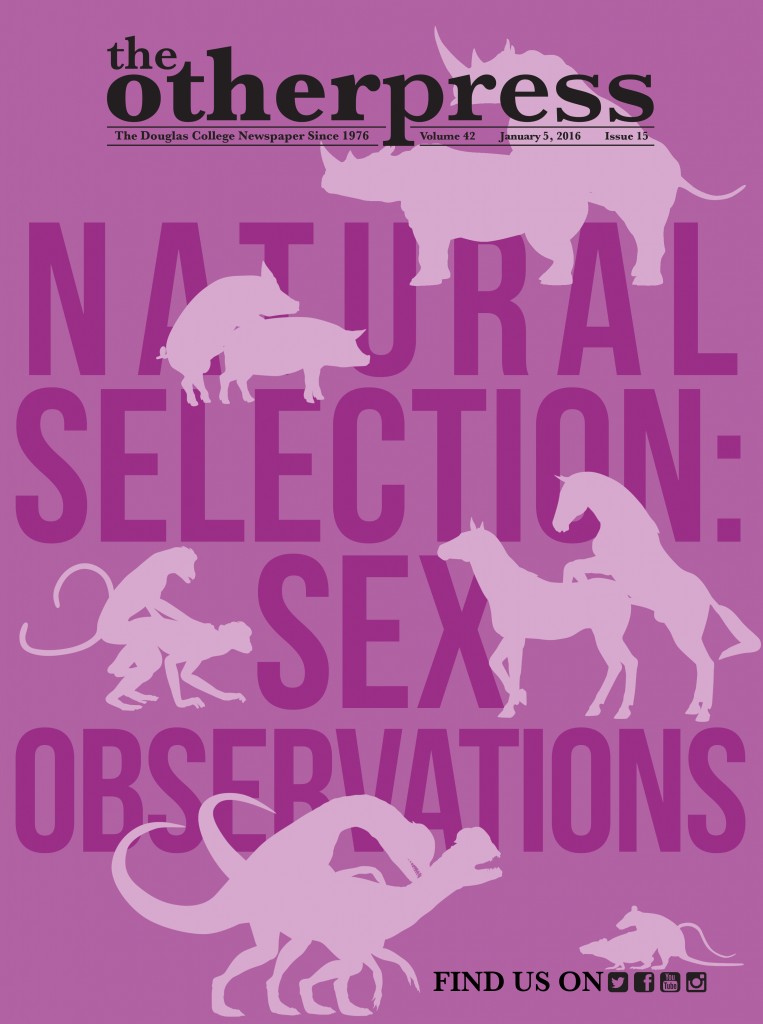
Observations about the world of sex
By Adam Tatelman, Staff Writer
Sex is a fascinating concept. Ever since the ancient Sumerians bashed their records into stone tablets for ease of reference, human beings have been fascinated with the magnetic force that drives people to rut each other stupid. Many have tried to explain it over the years, offering nebulous concepts that don’t make very much sense. The following observations shall seek to penetrate this ancient mystery and uncover what defines sexual attraction in heterosexual relations.
Observation 1: Sex is survival
We are mortal. Therefore all beings, even germs, are driven to replace themselves. In a sense, those who reproduce control the future. This is legacy. Humans have the biological means to create legacies, and we enjoy doing it. That’s why there are so many of us. Most species are sexually dimorphic; the male and female are identifiable by different sexual characteristics and behaviors. The males produce the sperm necessary for conception, and the females carry embryos to term—with the notable exception of some species like seahorses. Though the sexes are equal partners in conception, they are not interchangeable in terms of procreation. This will remain true until gender reassignment surgery permits women to produce sperm and men to bear children.
These are all obvious facts. Their immutable nature is the base upon which all societal structure is set. To some degree, everything we do as sapient beings we do towards the goal of survival. By this dated thinking, since most of us aren’t living in the wild, if sex/procreation is “the goal,” then it is not only logical but natural to conclude that males and females of the species assume different strategies of living and mating in order to achieve “the goal.”
Say you have a prehistoric tribe of 10, consisting of 5 men and 5 women. The tribe’s goal is to grow as quickly as possible. They can produce five children per year, assuming they all get along. Obviously, if a woman dies, the number of potential births per year will reduce. This is not true, however, even if four out of the five men die. The women are the limiting factor in reproduction, while the men are more expendable, so the logical response is for the men to do the dangerous work: hunting food, defending against predators, manual labour, and so forth. This is likely where the image of women as caregivers and men as protectors first originated, thus simply explaining the concepts of masculine and feminine behaviour found throughout much of human history. They were quite literally roles born of environmental necessity.
Observation 2: Sex is amoral
While there is a definite philosophical discussion to be had about the idea of love in relation to mating, I would like to discuss the popular convention that sex is something special that people only share with the right partner. Let us for now make a clear demarcation between sex and romance. The former is an instinctual urge, the rhythm of the ages. The latter is a social concept that encourages attachment. This is not to say that the two shall never meet in the middle, but it is foolish to assume their parity.
Now, I do not suggest that sex is immoral; I mean to say that mate selection is a competition. In either instance we can impose rules upon the situation, but they will only hinder those who accept a moralistic view of the concept to begin with. Those who do not will inevitably have more success regardless. There may be a rulebook on how to conduct oneself while competing, but those who win, win, and those who lose, lose.’ “The goal” does not care about the means.
Not surprisingly, most people do not like to think of sex this way. It flies in the face of the typical wisdom that hopeless romantics like to regurgitate. Doggedly hanging on for ”the one” in the hopes that he or she will one day notice you is a poor way to achieve “the goal.”
This brings up a lot of ugly little details related to sex that people try to ignore. It is the end result of an extremely shallow selection process. To stereotype the two genders, men tend to be more visual, making assessments of fertility by observing physical attributes. This may go hand in hand with the “sexy son” theory; the idea that a more attractive mate implies more attractive offspring, ensuring greater future legacy.
Women are just as visual, but also tend to respond to perceived masculine behaviour. Men who demonstrate the greatest physical health, confidence, and social leadership project desirability because, in theory, they are capable of protecting the tribe. Some may argue that common attitudes suggest that this is not the case—that men and women do not select mates differently—but human behaviour often speaks for itself. As we have established, men and women are equal partners in conception, but they are not interchangeable, therefore their selection methods differ by necessity.
Observation 3: Sex is natural selection
“The goal” is not fair. It is not a birthright. It must, indeed, be earned. Out of a sense of decency, we as a society like to deny these self-evident facts in order to appear civilized, to differentiate our cosmopolitan selves from those base sapient creatures lower down on the food chain. We cannot deny that our selection methods differ not a bit from those used by nature’s rank-and-file. In order to be traditionally sexually attractive, men must prove themselves strong leaders, and women must prove themselves fertile.
The fact of the matter is, whether you are a man or a woman, most of the people on the planet do not want to have sex with you because they think they can “do better.” This is immutable, how attractive or unattractive you may be. What “better” means—and whether or not they can, in fact, “do better”—is debatable. As above, “better” is interpreted differently by men and women, but both share the motivation to find the most appealing partner they can, pertaining either to attractiveness or social status.
In order to keep the syllogism on point, let us say that fully two-thirds of the human population ascribe to a similar ideal of attractiveness for both men and women. The minority has sexual tastes contrary to the established norm. Those who correspond most closely to this ideal will have the easiest access to sex, and therefore reproduction. Those who do not will still attempt to “punch above their weight class,” in a manner of speaking. This is where the idea of “doing better” comes from, and most people exhibit this behaviour.


